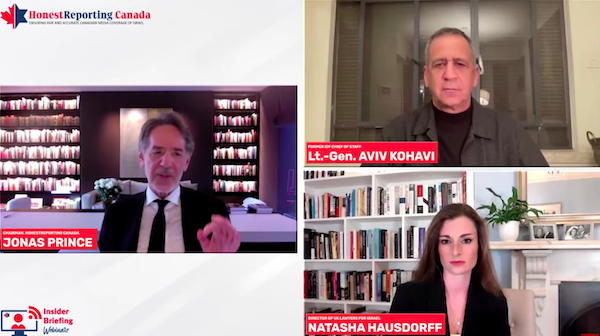British barrister Natasha Hausdorff speaks with StandWithUs Canada executive director Jesse Primerano in Toronto on June 11, as part of a four-city Canadian tour. (photo by Dave Gordon)
British barrister Natasha Hausdorff is challenging prevailing narratives about Israel’s legal rights, arguing that the uti possidetis juris principle of international law – which mandates that newly independent states inherit their predecessor’s borders – undermines claims of “illegal occupation” and “settlements” in the West Bank and Gaza, and exposes what she calls a double standard in global responses to territorial disputes.
Hosted by StandWithUs Canada, Hausdorff spoke June 9 in Vancouver, at King David High School. On June 10, she was in Calgary and, on June 12, Montreal. On June 11, she spoke in Toronto at the Nova Exhibition, which features videos, presentations and artifacts from the Hamas-led Oct. 7, 2023, attack on the Nova music festival in Israel. (See jewishindependent.ca/ visiting-the-nova-exhibition.)
Uti possidetis juris “is a universal rule that applies as a default wherever there is no agreement to the contrary,” Hausdorff explained at the Toronto talk. Mandatory Palestine – which included today’s Israel, Judea and Samaria (the West Bank) and Gaza – would, by law, become Israel’s territory, at the time of independence.
In 1967, Israel recovered Judea and Samaria, the eastern part of Jerusalem and Gaza, and expected a forthcoming “land for peace” formula with Jordan, she said. But, in the 1994 peace agreement between the two countries, Jordan stepped back from any demands for territory.
Hausdorff said there are modern parallels, giving as an example the “consensus that Russia has occupied Crimea from Ukraine.” According to international law, once the Soviet Union collapsed and its former states declared independence, the states inherited the previous borders, which means Crimea is Ukrainian territory.
If Ukraine were to recover Crimea from Russia in the same way that Israel recovered East Jerusalem and Judea and Samaria from Jordan in 1967, she said, most likely no one except for Russia would complain Ukraine had taken what didn’t belong to them.
She sees world bodies guilty of a double standard, “a total inversion of international law.”
“You cannot have a general rule and an exception for a country you don’t like very much, that you have some political or ideological opposition to,” she said. “You cannot occupy what is your own sovereign territory – it puts the lie to illegal settlements, which is predicated on calling this land occupied.”
Hausdorff, an expert in international law, regularly briefs politicians and organizations worldwide on legal matters, and has spoken at parliaments across Europe.
On the charge of genocide against Israel, she said Amnesty International’s report with the allegation had faulty methodology – including using “local authorities in Gaza,” a codeword for Hamas, as a source. The report cycled through several parts of the United Nations and, in turn, made its way to the International Court of Justice, she said.
The “disinformation cycle” continues to spin its way through the media, who “are complicit in parroting this Hamas propaganda and in snuffing out the realities of the situation,” she added.
Several issues cast a pall over the international court, including that it has no jurisdiction over Israel, which isn’t a signatory – and neither is the Palestinian Authority, for lack of a state, said Hausdorff.
The International Court of Justice lost more credibility when, last year, it called for the ethnic cleansing of Jews from East Jerusalem and Judea and Samaria, she said. “That is unacceptable on every basic moral level. The position that Jews should not live in certain areas simply because they are Jews is what is being advocated by the international community?” she questioned.
The court’s former president, Nawaf Salam, who left his post earlier this year to become Lebanon’s prime minister, had called Israel a terror state while he was an ambassador to the UN. “A judge like that would need to recuse himself,” she said, owing to a clear conflict of interest.
“If we are going to be honest about the drivers of this conflict,” she said, it would be “indoctrination to terror, incentivization to terror – that is what the international community needs to commit itself to counter.”
StandWithUs Canada executive director Jesse Primerano told the Jewish Independent that the speaking tour’s goal was for attendees “to hear the legal truths buried beneath the headlines.”
“With Israel’s legitimacy and actions constantly under scrutiny, it’s more important than ever to turn to experts who can clarify the facts,” said Primerano.
“What became most clear over the week,” he said, “was this: in a world where truth is often distorted, Canadians are eager for clear, fact-based insight to push back against the rising tide of misleading narratives.”
Dave Gordon is a Toronto-based freelance writer whose work has appeared in more than 100 publications around the world. His website is davegordonwrites.com.


